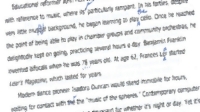You Too Can Sniff Out Scams!
by Marcia Yudkin
When the alleged crooked practices of one book-doctoring firm showed up on page one of the
New York Times, what astonished me most was the size of the haul the scamsters had supposedly taken in from hopeful writers: $5 million. Even if that particular firm goes out of business, so much money can be made taking advantage of writers-to-be that we're bound to see other villains leaping forward to take their place.
So while a catalog of suspect firms might be helpful, a more useful, lasting resource is a roster of the tell-tale signs that should arouse suspicion about an operation purporting to serve writers and a repertoire of ways to check on the legitimacy and validity of its offerings. Armed with these tips, you too can learn to sniff out scams, protecting yourself from rip-off artists who prey upon writers' dreams of getting their work published.
Tell-tale Signs of Scams
1. "We recommend..." A common scenario these days: You send your submission off to a literary agency or smaller publisher, and receive a letter praising your work. It would be publishable with some editing
- and the letter recommends a particular person or firm. Your nose should already be detecting a fishy smell here, and if you receive a followup letter from the recommended party, both operations involved are almost certainly rotten.
|
Many so-called book doctors and editing services do actually help make marginal manuscripts and proposals publishable. Unfortunately, however, some pump writers up with false hopes, charge outrageously for generic suggestions and pay literary agencies and publishers kickbacks for referring suckers to them. The tip-off in the letter you received is the recommendation of one and only one service to fix the supposed faults of your work. Chances are high in this case that any praise of your work was insincere, that every submitter gets the same response and that the recommender and recommendee are in league to profit from vulnerable writers. Run the other way.
|
|
Published! How to
Reach Writing Success
|
|
2. "Fork over..." You submit your work to a literary agency, and before they'll look at it, they request a "reading fee." Or they look at it for free and request a "marketing fee," "contract fee," "retainer" or "expenses"
up front before they'll represent you. Some folks may give different advice here, but I recommend in both cases that you keep looking for an agent. The best agents - those who sell enough books to publishers to support their overhead and even take vacations
- do not charge reading fees. And any out-of-the-ordinary expenses they charge to writers they deduct from advances and royalties that come in for the writer. Any agent who asks you to write out a check is probably either greedy, incompetent or disreputable. Decline.
3. "Co-invest..." You may be savvy enough to recognize that "subsidy publishing" is usually a whitewashed label for vanity publishing, which publishes anything backed up by a check for tens of thousands of dollars, and inevitably disappoints its authors because vanity press books are hardly ever reviewed or accepted by book distributors. But what about "co-publishing," or a "joint venture," where the publisher asks you to share the risks and rewards of publishing? Red flashing lights should go off when you read this request. Tread very, very cautiously here.
|
Become a Successful Freelance
Writer - Start Today!
Slash your learning curve by completing nine
article idea generation and writing assignments
and gaining feedback from a Book-of-the-Month Club
author who has published in the New York Times
Magazine, Business
2.0, Psychology Today, USAirways, TWA Ambassador
and many other top publications. Magazine
writing course for beginners. |
One co-publishing outfit persuaded authors, perhaps as many as 8,000 of them, to pay upwards of $3,000 each to have 10,000 books printed, marketed and distributed. Hundreds of these authors are now complaining about broken promises, trying to figure out ways to get their money and rights back. Though some co-publishing arrangements are legitimate, many share the weaknesses of traditional vanity presses -- no quality control, extravagant promises and failure to deliver the goods.
4. "You just have to buy..." This scam is perfectly legal, but it leads to heartbreak all the same. You see an ad for poetry contest offering big prizes, and you send in your stuff. Back in the mail comes a letter praising your lovely poem, which although it did not win a prize, was still deemed worthy of publication. To guarantee inclusion in the anthology, and to receive a copy of the book, you just need to write a check for $49.95.
What's wrong here? It's a vanity operation, with no quality control. You pay the fee, you get into the anthology. Meanwhile, libraries and bookstores will not carry the book, and mention of your "publication" to those in the know brands you as a dupe, not a genuine poet.
I've received similar "pay the fee to get in" solicitations to be included in Who's Who compilations, and discovered that the legitimate company that publishes Who's Who volumes can't prevent unscrupulous firms from using their famous title and charging for admission.
And what about entry fees for poetry contests? Ironically,these are considered acceptable in the literary world, as the $5 or $10 entry fees often support the judging and prizes. Before entering one of these contests, make sure that the prize includes publication in a periodical that has a history, a reputation or a significant circulation.
5. "We found your name..." A writer recently called me to ask about a letter he'd received congratulating him for having registered the copyright for his book and offering to represent his book to major publishers. He was smart to be suspicious. Reputable literary agencies don't send out generic solicitations
- it's not a cost-effective way to find publishable work.
In years past, many writers were taken in by a literary agency that sent out brochures to
Writer's Digest subscribers. This agency had two
divisions - one for representing world-famous writers and another for taking fees from wannabees. Any generic solicitation is likely to lead to a request for money.
Note the qualifier "generic," because if you publish an article or short story you may receive a personal letter from an agent who obviously read and admired your work. You should still perform due diligence, but this could represent your lucky break rather than the come-on for a scam. Legitimate agents do solicit promising writers one-on-one in this way.
6. "We're looking for writers..." Regard any paid advertisement from a literary agent in a magazine, or the equivalent in an Internet newsgroup, with skepticism. Good literary agents receive all the submissions they can handle through listings in directories and word of mouth. Only marginal agents go out on the hunt in these ways.
One agency that indiscriminately spammed Internet newsgroups in a search for clients and then waged a campaign of harassment against writers who tried to expose it actually exposed itself when it asked prospective clients to submit three poems, three short stories, three articles or three book chapters. Real agents do not look to sell poems, short stories or articles for writers
- only books.
|
Ready for the World's Top
Magazine Assignments?
If you have impressive clips and a track
record writing solid stories but can't crack
top markets, you need the advanced
"Breaking Into Major Magazines"
course. Discover the factors that make the
difference between just-okay, publishable
writing and the kind that gets published in Smithsonian,
National Geographic, Outside, Atlantic
Monthly and other glossies.
Advanced magazine
writing course.
|
Checking Out Your Suspicions
If you're online, it's easy to get fast feedback on questionable literary outfits. Post a notice asking about the specific agent or publisher you're investigating
on message boards or discussion lists frequented by
writers. Or visit these web sites:
Write Connection's Questionable Agents List: http://members.aol.com/WconnectOL/agents.html
Science Fiction Writers of America: Writer Beware: http://www.sfwa.org/Beware/Warnings.html
Nebraska Center for Writers: http://mockingbird.crieghton.edu/NCW/litag.htm
Perhaps counter-intuitively, you may get better information from amateur writers in this regard than from the pros, who already have agents. The collective wisdom of other writers who have been looking for agents for some time is priceless.
For National Writers Union members, often one person in your chapter
- perhaps the grievance officer - serves as the informal repository of information about writing scams. For more information about joining the National Writers Union, visit its
web site at http://www.nwu.org.
 |
Improve Your
Proofreading
Quick online course teaches how to
catch pesky typos. Whether you check
writing on screen or on paper, learn the
stakes for error-ridden copy, the five
best proofreading methods and the tools
you can or shouldn't use to identify
errors. Includes practice tests and
answers.
Proofreading Hacks course. |
Self-protective Rules
You won't get scammed if you adopt these general principles:
1. If something sounds too good to be true, it probably is.
2. If you want an assessment or editing of your work, get it from someone you've sought out for that purpose
- not from someone who approached you, representing himself or herself as an agent or recommended by an agent or publisher.
3. Ask for references of work sold, works published, satisfied clients, etc. If an agent or book doctor says that information is confidential, look elsewhere.
4. Reputable publishers pay writers; reputable agents work on commission. Anything else should arouse suspicions.
5. Don't use the following criteria to disqualify agents or publishers: lack of a business listing with the telephone company; lack of a listing in
Literary Marketplace or anywhere else; an answering machine or voice mail instead of a receptionist. These days many legitimate agents and small publishers work out of their homes and use the same strategies to keep their costs down that many writers do. And if they're new, they may not have made it into the cycle for inclusion in the usual listings.
Copyright 2005 Marcia Yudkin. All rights reserved.
|






